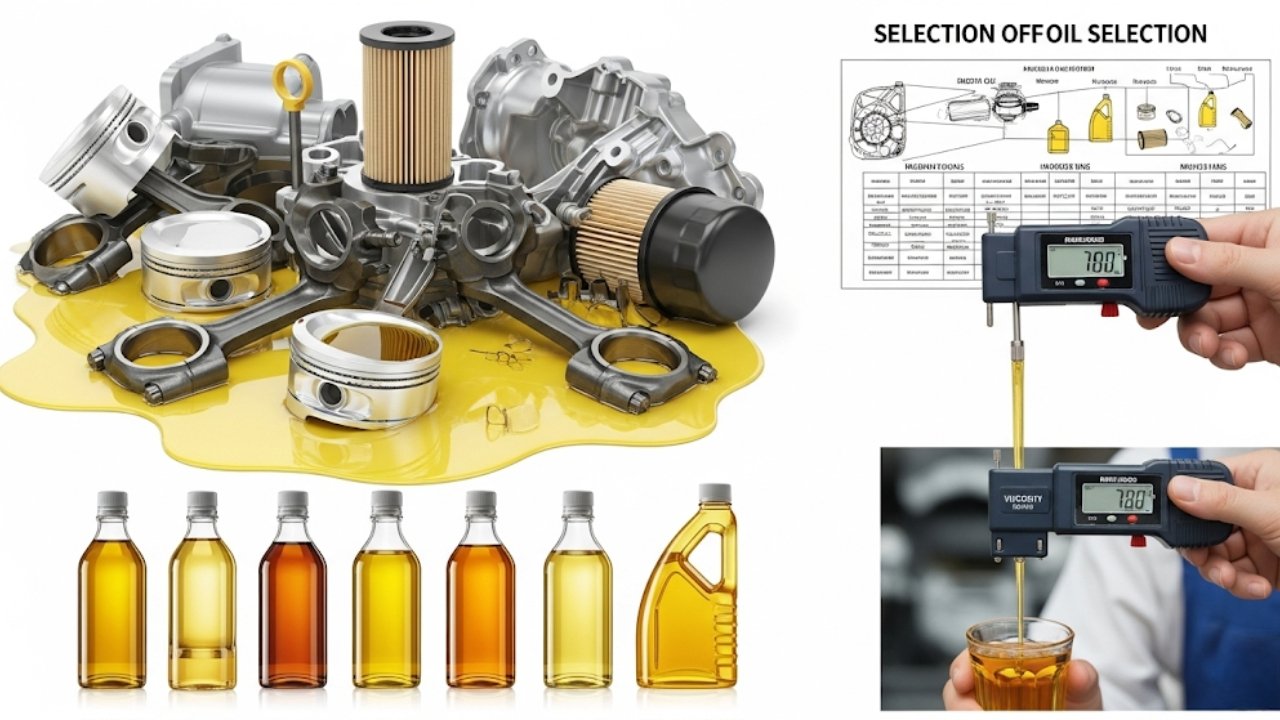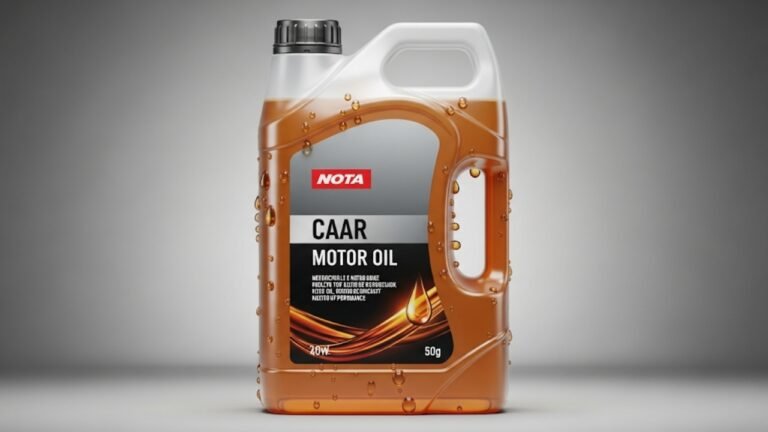Engine Oil by Car: The Right Match for Your Ride

Ever tried putting the wrong spice in a dish and ended up ruining the flavor? That’s what happens when you use the wrong engine oil by car. It might seem like a small thing, but choosing the right engine oil is as essential as using clean water for cooking. Your car’s engine is a beast under the hood, and oil is its lifeblood.
I remember once pouring an old leftover bottle of oil into my cousin’s Toyota without thinking. It was thick and cheap. A week later, the engine was wheezing like it had just run a marathon. Lesson learned: engine oil isn’t one-size-fits-all. Each car has a personality, and the oil you choose matters deeply.
In this guide, we’ll talk like old friends over tea. I’ll walk you through how to choose engine oil by car, why it matters, and how to avoid common mistakes.
Understanding Engine Oil: It’s More Than Just Lubrication

-
Cools your engine by carrying away heat
-
Cleans by catching dirt, metal shavings, and soot
-
Protects by forming a barrier between moving parts
-
Improves fuel efficiency by reducing friction
It’s like a superhero multitasking inside your engine every second. But not all oils are created equal.
There are four major types of engine oil:
| Type | Best For | Lifespan |
|---|---|---|
| Conventional | Older or low-mileage cars | 3,000–5,000 km |
| Synthetic | High-performance and modern engines | 10,000–15,000 km |
| Synthetic Blend | Mix of synthetic and conventional | 7,000–10,000 km |
| High-Mileage | Cars with 120,000 km or more | 5,000–8,000 km |
Each oil has its own mission. So when people search for “engine oil by car,” what they’re really asking is: “What’s my engine’s perfect match?”
Why Your Car’s Make and Model Matters
Let’s break this down with a metaphor. Think of engine oil like shoes. A runner needs lightweight sneakers. A hiker? Heavy-duty boots. Similarly, your car needs the oil that fits its engine’s lifestyle.
For example:
-
A 2015 Honda Civic might need 0W-20 synthetic oil
-
A 2006 Ford Ranger may prefer 5W-30 high-mileage oil
-
A BMW X5 demands fully synthetic performance oil
Car engines are tuned differently. The wrong oil can cause:
-
Rough starts
-
Poor mileage
-
Increased wear and tear
-
Costly engine damage
So don’t guess. Always check your owner’s manual. Or use online lookup tools where you enter your car’s year, make, and model — they show the best engine oil by car in seconds.
Viscosity Explained: What 5W-30 Actually Means
Ever seen “5W-30” and wondered what it meant? Here’s a quick breakdown:
-
The number before W (“winter”) tells how the oil performs in cold starts
-
The number after tells how it flows at high temperatures
So 5W-30:
-
Flows easily at low temps (5W)
-
Stays thick enough to protect at 100°C (30)
Lower numbers = thinner oil
Higher numbers = thicker oil
Here’s how it matters:
| Viscosity Grade | Weather Suitability | Common Vehicles |
|---|---|---|
| 0W-20 | Very cold climates | Newer Japanese cars |
| 5W-30 | Moderate temperatures | Most sedans and hatchbacks |
| 10W-40 | Hotter climates | SUVs and trucks |
If you live in a hot, humid city like Dhaka or Delhi, a slightly thicker oil might work better. In colder areas like Christchurch or Ontario, thinner oil helps the car start smoother.
How to Choose the Right Engine Oil by Car
Choosing the right engine oil by car is easy if you follow a few simple rules. Think of it like matchmaking for your engine.
️ 1. Check the Owner’s Manual
Always your first step. It tells the oil weight, type, and even recommended brands.
2. Look for Certification
Good oils have labels like:
-
API (American Petroleum Institute)
-
ACEA (European standards)
-
ILSAC (for North America)
These ensure quality and compatibility.
3. Match to Driving Conditions
-
Short trips? Use synthetic. It resists breakdown better.
-
Heavy loads or hills? Go for a slightly thicker viscosity.
-
Older car? Try high-mileage oil to condition seals and reduce leaks.
4. Stick to a Schedule
Don’t just rely on kilometers. Change oil:
-
Every 6 months (even if you don’t drive much)
-
After long road trips
-
When switching climates
Real Story: How the Wrong Oil Cost Me
About three years ago, my uncle bought a used Toyota Corolla from Japan. The seller said it had “new oil,” so he ignored changing it. He thought all oils were the same.
A month later, the car stalled in the middle of traffic. Turned out, they used thick 20W-50 oil, which choked the smaller 1.5L engine. After a hefty bill and a mechanic’s lecture, we switched to 0W-20 synthetic — smooth as butter ever since.
Moral of the story? Don’t just trust anyone. Learn about engine oil by car, and your wallet will thank you later.
Common Mistakes When Choosing Engine Oil
Many people — including me once — make these oil blunders:
-
Using wrong viscosity
-
Mixing oil types (don’t blend synthetic with conventional)
-
Waiting too long for oil changes
-
Ignoring climate factors
-
Not checking for manufacturer approvals
Avoiding these can save thousands over a car’s lifetime. Trust me, engines are expensive. But engine oil? A fraction of the cost — and absolutely worth it.
Signs You’re Using the Wrong Engine Oil
So how do you know if your car’s sipping the wrong juice? It’ll tell you — sometimes loudly. The engine doesn’t just “adapt” to any oil. Here are some clear symptoms:
-
Ticking sounds during startup
-
Increased oil consumption
-
Sluggish acceleration
-
Burnt oil smell
-
Engine warning light
If you notice any of these after an oil change, the culprit might be your oil type or viscosity.
A friend of mine, Riaz, once used high-mileage oil in his brand-new SUV — thinking thicker was better. Two days later, he told me the engine sounded “lazy.” We flushed it and used the recommended 5W-30 synthetic oil — problem gone.
Always match the engine oil by car recommendation — not assumptions.
Synthetic vs. Conventional Oil: What’s the Real Difference?
You might wonder: “Why pay more for synthetic oil?” Here’s the deal.
Conventional oil is refined crude oil. It works fine for basic engines and short commutes. But it:
-
Breaks down faster
-
Sludges up in heat
-
Struggles with cold starts
Synthetic oil is engineered in labs. It’s:
-
Purified
-
More stable in extreme temperatures
-
Better at cleaning and protection
Summary Table:
| Feature | Conventional Oil | Synthetic Oil |
|---|---|---|
| Cost | Cheaper | More expensive |
| Lifespan | Shorter (3k–5k km) | Longer (10k+ km) |
| Heat resistance | Moderate | High |
| Cold-weather startup | Slower | Fast and smooth |
| Sludge control | Poor | Excellent |
So, if your budget allows, synthetic is worth every penny. Especially if you want to keep your car young and strong.
How Often Should You Change Your Engine Oil?
This depends on your driving habits, oil type, and vehicle. But here’s a general guide:
-
Synthetic Oil: Every 10,000–15,000 km or 6 months
-
Synthetic Blend: Every 7,000–10,000 km or 5–6 months
-
Conventional Oil: Every 3,000–5,000 km or 3 months
-
High-Mileage Oil: Every 5,000–8,000 km or 4 months
Still unsure? Always refer to your owner’s manual or digital maintenance tracker.
Also, use the dipstick method once a month:
-
Pull out the dipstick
-
Wipe it clean
-
Reinsert and check level
-
Look at the color — dark and gritty oil = time to change
This simple habit can save your engine from disaster.
Best Tools to Find the Right Engine Oil by Car
You don’t have to guess anymore. There are tools that recommend oil based on your car’s details.
Top Free Tools:
-
Castrol Oil Finder
-
Valvoline Oil Selector
-
Mobil 1 Oil Selector
-
OEM Service Apps (Toyota, Honda, BMW)
Just input your:
-
Car brand
-
Model
-
Year
-
Engine size
They’ll show you exactly what oil your engine needs. Bookmark one of them on your phone — you’ll thank yourself at the next service.
Top 5 Brands of Engine Oil (Worldwide Trust)
If you’re unsure which brand to pick, here are some top players globally:
-
Mobil 1 – Famous for synthetic performance
-
Castrol EDGE – Great for long drives and protection
-
Valvoline – Reliable with both synthetic and blends
-
Shell Helix Ultra – Known for fuel efficiency
-
Total Quartz – A popular choice in Asia and Europe
Don’t just go for the cheapest bottle. Look for API and ILSAC ratings and your car’s manufacturer approval.
DIY Engine Oil Change: A Step-by-Step Shortcut
Want to change oil yourself? Here’s a quick guide (but be safe!):
What You’ll Need:
-
Correct engine oil by car
-
New oil filter
-
Oil pan
-
Funnel
-
Gloves
-
Wrench
Steps:
-
Warm the engine (but not too hot)
-
Lift the car safely using a jack
-
Drain old oil into pan
-
Replace oil filter
-
Pour new oil using a funnel
-
Check level with dipstick
-
Dispose old oil properly
Doing it yourself saves money, builds skill, and gives you total control over your engine’s health.
Common Myths About Engine Oil
Let’s bust a few myths that cause confusion:
-
❌ Thicker oil is always better
Thicker oil can strain small engines, especially in cold climates. -
❌ You can mix synthetic and conventional oil
Technically yes, but it’s not recommended. It reduces both oils’ effectiveness. -
❌ You don’t need to change oil often if you don’t drive
Even sitting cars need oil changes — oil ages over time, not just distance. -
❌ Dark oil means it’s dirty
Dark color isn’t always bad — it might just mean it’s doing its job catching debris.
FAQs About Engine Oil by Car
1. How do I know which engine oil to use for my car?
Check your owner’s manual, use online lookup tools, or ask a trusted mechanic.
2. Can I switch from conventional to synthetic oil?
Yes, most modern cars allow it. Just make sure the oil meets your car’s specs.
3. What happens if I use the wrong oil viscosity?
It can cause poor performance, wear, and even engine damage over time.
4. How often should I check my engine oil?
At least once a month, especially before road trips or after long drives.
5. Is synthetic oil worth the extra cost?
For most drivers — yes. It lasts longer, protects better, and helps your engine run cleaner.
6. Can I extend oil change intervals if I use synthetic oil?
Yes, but still follow your manufacturer’s schedule for the best results.
7. Why is my oil level dropping quickly?
Could be due to leaks, worn seals, or engine burning oil — get it checked.
8. Do electric cars need engine oil?
Nope! Electric cars don’t have combustion engines, so no oil needed.
Conclusion: The Oil You Choose Shapes Your Car’s Future
Think of your car’s engine as a heart. The engine oil is its blood. Every drop counts. Using the right engine oil by car isn’t a luxury — it’s a necessity.
I’ve learned through mistakes, surprises, and long conversations with mechanics that oil choice can make or break an engine. Whether it’s a daily commute, weekend drive, or long-distance haul — your oil must match your car’s needs.
So next time you walk into an auto shop or browse online, don’t just grab what’s cheapest. Think: “What’s the best engine oil by car for my engine?” And make a confident, informed decision.
Because your car deserves nothing less.






